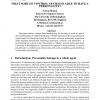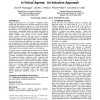263 search results - page 39 / 53 » Multi-agent Systems as Intelligent Virtual Environments |
CANDC
2005
ACM
13 years 9 months ago
2005
ACM
In this paper, we discuss how a cognitive concept, causality, can be used for the conceptual underpinning of Virtual Reality Art installations. Causality plays an important role i...
OFAI
1997
Springer
13 years 11 months ago
1997
Springer
This paper outlines a design-based methodology for the study of mind as a part of thebroaddisciplineofArtificial Intelligence. Withinthat frameworksome architectural requirements...
ATAL
2008
Springer
13 years 9 months ago
2008
Springer
Humans continuously assess one another's situational context, modify their own affective state, and then respond based on these outcomes through empathetic expression. Virtua...
AIED
2009
Springer
13 years 5 months ago
2009
Springer
Educational games may be particularly suited to teaching social learning skills with virtual humans. We investigate the importance of social goals and engaging social interactions ...
MM
2004
ACM
14 years 29 days ago
2004
ACM
We introduce a novel approach to the creation of Virtual Reality Art installations, which supports the design of alternative worlds, in which laws of Physics can be redefined to i...



